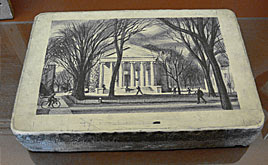What are the Printing Processes?
The three main printing processes are Relief, Intaglio and Lithography. These processes all include a transfer of ink from a certain surface to paper. All of them have a different process which I will explain in detail.
Relief
Use tools similar to a woodcutter would if working on wood
Tone the block with Indian ink wash or wash of a jet black film. This works on linoleum but isn't necessary
Use Iron Oxide or Carbon paper transfer that has your design already on prepared
Transfer the image
Decide on if you want to use White line, which reveals the image through thin white lines, or Black Line, which is removing majority of the wood to reveal the image. A balance of boh is usually used.
Roll ink onto the block
Place in Press
If done by hand, use a baren, which is a tool used to transfer the ink from the block to paper, ad apply gentle pressure all over the paper on the block.
carefully pull the paper off of the block and check to make sure the image transferred.
Intaglio
prepare plate by cleaning it
smoke the plate by placing it upside down
scratch away the ground to reveal the metal
etch the plate for fifteen minutes
submerge plate in a bath/pan of acid
clean the plate again
wipe the plate with ink
hand-wipe the edges
put chalk on your hands and brush over the surface
set on press
use a dampened sheet of paper
print.
Lithography
use Lithographic materials/pencils/crayon to draw on stone
remove grease with sandpaper or razorblades if needed
Once drawing is finished, use gum arabic and rub all over stone
Use rosin and Talc to establish drawing
Apply acidified gum arabic or TAPEM
apply more gum arabic
use cheesecloth to buff in
use lithotine
use aphaltem
apply water to clean
rub ink with an ink roller over the image
apply dampend paper
press.
repeat adding ink to stone and press four to six times.
Which one would I do?
I'd do lithography because I don't know much about wood or metal and I think stone would be a similar surface to paper since I draw a lot. I think these processes have some influence in contemporary design.



No comments:
Post a Comment